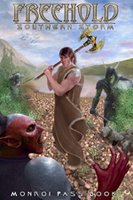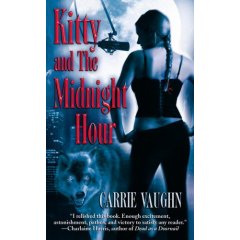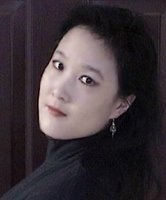Interview - Armand Rosamilia

 Armand Rosamilia, owner of Carnifex Press and the creator of the Freehold Shared World series, is a writer, editor, and a big Heavy Metal fan. In other words, he's just one cool dude.
Armand Rosamilia, owner of Carnifex Press and the creator of the Freehold Shared World series, is a writer, editor, and a big Heavy Metal fan. In other words, he's just one cool dude.How did Carnifex Press get started?
It all started about 10 years previously, as I had Black Moon Magazine in the mid-1990's, a print magazine filled with horror fiction, Heavy Metal interviews and reviews, and basically dark things. It lasted a few issues but there was a difference of opinion between my partner and I about the direction, so we split up and Black Moon folded. I continued writing short stories (mostly fantasies set in my Freehold world) on and off but not seriously. When I decided in about 2003 that I wanted to get them published I looked around, saw a lack of fantasy/horror small-press publishers that might want to publish my stuff, and decided to do it myself. Instead, I focused on being a true publisher instead of self-publisher and started with the first Clash of Steel anthology.
As an editor, what are the qualities you look for most in a story?
You have to grab me from the first three paragraphs or else you'll lose me. So many writers feel the need to 'info- dump' their big, grand plots up front and push the character to the background. You won't catch an editor like that. Dialogue is also a big factor. I don't know how many stories I've rejected over the two years of Carnifex Press due to slang and lazy dialogue in fantasy stories, stories that might have been good but made me stop reading.
Being both a writer and an editor, does your work as an editor improve your writing skills?
Immensely. When I went back and started to rework some of the older Freehold short stories (some dating back to 1986) I immediately caught so many common mistakes that writers make, and I used to make... I still make too many mistakes, but I can catch some of them now. When Misty Gersley came to me to edit Withersin Magazine, I told her that her own writing would improve because of editing, and she saw it right away.
What are your favorite genres and subgenres?
I hate pigeon-holing everything into neat little titles, but anything Fantasy and Horror is good with me. I am a huge Conan fan, a huge David Gemmel fan and a huge RA Salvatore fan. I am in the midst of collecting the entire series of Forgotten Realms books (there's 200+ right now!) because I am insane. I love any fantasy with a strong character who kills things... I hate wizards, female leads and wimpy kids growing up to be warriors most of the time. In horror, you need to scare me... I don't need gore, it is so five minutes ago.
How did you come up with the idea for the Freehold shared world series?
The idea came out of a Dungeons & Dragons campaign I ran (I was a super-uber D&D geek in junior high and high school) for a number of years, all set in my world of Freehold. It was based on the premise that magic had been taken away - I hate wizards - and I created maps and characters and storylines. I wrote short stories based on some of the ideas and never stopped. When I was happy with the direction of Carnifex Press, I decided to pull it all back out, gather some writers and see what happens. I could not be more happy so far with the stories and
ideas that are flowing. I have four trilogies as well as novellas and single books that I'll be releasing... someday I'd love to challenge Forgotten Realms in sheer volume of good books.
And perhaps challenge them by creating a world for RPG players to game in, too?
I've actually tossed around the idea of a d20 Freehold game or perhaps my own creation, as well as a card game ala Yu-Ghi-Oh, but that is still far off in the future. I'd like to build Freehold as a brand name once the core reading fans are there and branch out. Maybe someday you can buy your kids an adorable stuffed Northlander doll or have a goblin doll that says cute things like 'kill the Freeholder dead'...
What are some of the challenges to working on a shared world series? And what are the advantages?
Well, the very first writing group I started for Freehold was a disaster. I had a bunch of writers that had no idea what I was looking for and I was hesitant to let people 'play in my world' and add their own ideas, so we spent months and months wondering what fauna was where, and about crops and the bartering system... real heavy Fantasy stuff, to be sure! I gave up on it for nearly a year, then contacted Nathan Meyer, who was in the first group and showed the most promise, and he helped me assemble a great group of initial writers like Steve Goble, Bruce Durham, M.P. Ericson, Heather Lee Fleming, Keith Gouveia, and Cindy Rodiana. I've since added quite a few other writers that are taking part in one of the other trilogies, and I'm always looking for more to be added. It's not about getting authors with big writing credits, it's about getting writers that show an enthusiasm for the process.
One challenge, initially, is getting the writers on the same page as far as what I'm looking for. With the above- mentioned writers it is so much easier now, as new writers are almost being 'policed' when they submit ideas... Freehold is a bit unique in that magic is no more, and has been gone for over 250 winters... so anytime they see even a hint of magic in a short story they point it out, which helps me immensely. An advantage is the way we write: I start out with the first draft of a 20,000 word novella that gets critiqued by everyone involved in that trilogy. They hopefully get a few ideas from that and submit character and plot ideas. I pick five stories for each book to go along with the novella, and they begin writing while I do a rewrite of the
novella. As they get something down on paper they submit it to the group, and get a critique right away on it. We work together until the book is finished, asking questions and sharing ideas along the way. Several characters have come out of the stories so far that have also had cameos in other stories, which is neat.
What kind of music do you listen to, and has it sometimes had an influence on what you write?
Music is a huge influence on what I write. I am a huge Heavy Metal fan - going to be 37 in November - and put on something great like Manowar when writing battle scenes. I've also gotten into Hammerfall lately to write, and when I want to do dark stuff or horror I put on King Diamond and some moody Black Metal to get me going. Some people need no noise, but I write with headphones on when I'm writing at home.
What are your future plans with Carnifex Press, and what are your future plans as a writer?
Carnifex Press will be releasing three more anthologies in 2007 and then only single-author novellas for the future. I am always looking for the best writers out there, whether horror or fantasy. As for my writing: I plan to finish all of the Freehold short stories I have (there are over 30 right now) and get them into markets. I already have three published, in Gryphonwood, Stalking Shadows anthology and coming in Sword's Edge.





